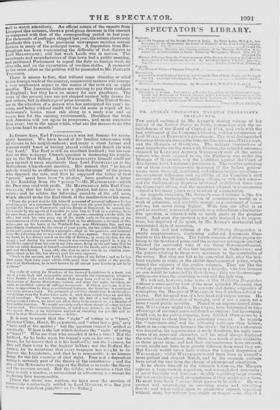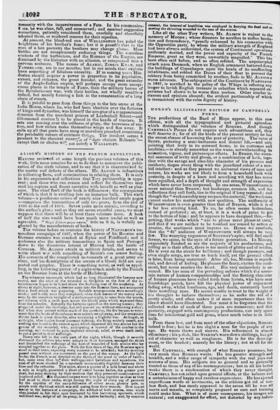MR. AUBER ' S INDIA—THE MAI:V:1S WELLESLEY'S DESPATCHES.
Tux period embraced in Mr. Arlint'S Closing volume of his history of the Brill Sit POlrer iii ladia, commences with the es- tablishment of' the Board of Control in 1 7S4, and ends with the last settlement of the Company's Charter, tied the termination of Lord WILLIAM BENTINCK'S government. The most distinguished Governor-Generals du ri og the time, are CORNWALLIS, WELLESLEY, and the Marquis of HASTINGS. The military transactions of most importance are the wars-with Timm°, the splendid successes obtained by LAKE and ARTHUR WELLESLEY over all the native
powers who were oeposed to us, the Pindarrie war under the Marquis of 11AsTteros, and the hostilities against the Court of
Ara during Lord AMHERST'S government. The treaties springing out of these contentions—the measures cf the Indian govern- ments upon themeial, territorial, and administrative questions—
the occasional differences and sgitabbles of the Company's civil servants with his :Majesty's military ellleers, or with each other— and the Parliamentare inquiries instituted at different times into the Company's affiirs, nnd the measures adopted in consequence —involve too many pints evea to admit of enumeration.
As regards character, Mr. AUBER'S secoed volume is like his first—a clear, bueiness-like pricis of occurrences ; useful as a
work of reference, and readable enough as a statement of trans- actions, but never rising higher. With him one affair is as good as another; a personal quarrel, or a subordinate administra-
tive question, is narrated with as much gusto as the greatest event. And even the greatest is not only lessened in its propor- tions, but deprived of its spirit, by Mr. AUBER'S mechanical and unanimated style of narration.
The fifth and last volume of the Trellesley Despatches is purely supplementary, containing collateral documents illus- trative of the Despatches. The fourth consists of state papers re- lating to the treaties of peace, and the pecuniary arrangements that followed the successful wars of the Great Governor-General. These subjects were of the first importance in themselves ; and the papers relating to them were necessary to the completion of the series. But they are felt to be somewhat dull, after the bril- liant exploits in arms, or the skilful development of policy, which formed the subjects of the earlier volumes. They are like the wind-up speeches of the survivors in a tragedy, who live because no one would be interested in their dying : they are the marriage- settlements when the courtship is over and the lathy won.
We will not, however, take leave of the 11-el1esley Despatehes without a retrospective view of the most splendid Proconsul that
England ever sent to India. In courage and daring originality of
conception, the Marquis of WELLESLEY was d effitless inferior to CLIVE. But his mind was of a lees hard and vulgar nature. He
possessed greater elevation of thought, and if not a purer, yet a
more fennel public morality. Placed in an unprecedented situa- tion, WELLESLEY might not, like Cm vie have determined to take advantage of circumstances and found an et111,;re; but he certainly would nut, in his public cepacity, have deluded Omeittneo by a forged treaty to cheat him in a pecuniary compect. As regards
the " ingenuous arts" and the softening intlusnee they bestow, there is no comparison between the rivals ; for CLIVE'S education was irregular, his opportunities of study deseltory, his early asso- ciates of an equivocal character, and his mind always displayed the tone of an adventurer. Still, there was mueh of real similarity in these great men; and had their circumstances been reversed,
events might not have been greatly different from what they are. But CLIVE would never have written the rotund despatches of WELLESLEY; whilst WE LLEsLRY would bare been in himself a more gallant and elegant Nabob, and by his example perhaps have saved the race limn the charge of purse-proud ostentation.
As he shows himself in the volumes b. Ire us, the Marquis appears a large-viewed, sagacious, and aecomplishei statesman ; of great foresight and firmeess : steadily regarding large events,
but not overlooking small circumstances if they :night affect them. He must have been " an emellent person to be wider.- He was prompt and ungrudging in awarding praise and rewarding desert and when called upon to administer reproof, reproviag without stint, but without personality or teineer — he °bee e 1 a
necessity with the impassiveness of a Fate. In his comMunica- 1)ns, he was clear, fall, and unreserved; and received suggestive corrections, patiently considered them, carefully and cheerfully adopted them, or rendered reasons for their rejection.
At present, the blood-red sun of %mamma/ has paled the brightness of his brother's fame; but it is possible that in the eyes of a late posterity the brothers may change places. Mere battles are not conspicuously enduring things. The countless contests of' the barbarians, and the Romans of the Empire, are dismissed by the historian with an allusion, or compressed into a nervous sentence. The names of ALARIC, ZING'S KHAN, and TAMERLANE, are in our mouths; but in our minds their exploits have something of fabulous unreality. If in coming )ears Hin- dostan should acquire a power in proportion to its population, extent, and richness, the great founder, and the great extender of the Anglo-Indian empire, will perhaps occupy more conspi- cuous places in the temple of Fame, than the military heroes of the Revolutionary war, with their battles, not wholly resultless indeed, but merely forming a link in the concatenation of a long chain of events.
It is painful to pass from these things to the late scene at the India House, where he, who had been absolute over the fortunes of kings and dynasties, was himself the acceptor of a compassionate donation from the merchant princes of Leadenhall Street—and (ill-omened caution !) to be placed in the hands of trustees. It sets one musing over the coldness of glory, the barreness of sta- tion, and how riches make themselves wings and flee away. It calls up all that poets have sung or moralists preached concerning the perishable nature of extrinsic things. The incident seems a pendant to the classical exarnele of "date obolum Belisario "— • except that an obolus not satisfy a WaLzenzy.



















































 Previous page
Previous page